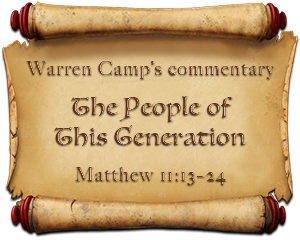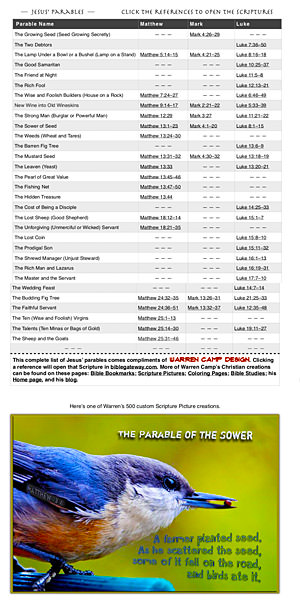
This teaching session began when John the Baptist sent two disciples of his to question Jesus.
Jesus answered John's disciples’ question by telling them that he was fulfilling prophecies made by Isaiah about John’s message regarding the changes that the Messiah will make to the land and its people (Isaiah 29:18 and 35:5–6).
Incidentally, Jesus spoke about the heaven-or-hell judgment more than anyone else in the Bible and in a very specific way. More than half of the parables that Jesus told relate to God’s eternal judgment of sinners.

† Find Warren’s short summary at the bottom of page.

Click the list or the “bird” to enlarge and use Warren’s list of forty-four of Jesus’ parables (a PDF file with links to Scriptures).
Start Reading Warren’s Commentary . . .
Find his summary at the bottom.
par•a•ble [noun] a simple story used to illustrate the meaning of or a moral or spiritual lesson, as told by Jesus in the gospels
synonyms: allegory, moral story/tale, fable
Jesus’ Parable of the People of This Generation
Matthew 11:13–24; Luke 7:31–35
Jesus was a superb storyteller who told listeners numerous parables. A number of them, such as the Sower, the Rich Fool, and the Prodigal Son are meaningful and memorable while others — the Good Samaritan and the Lost Sheep — are easily understandable and applicable. But today’s parable, as presented in Matthew’s and Luke’s gospels, is neither memorable nor easy to understand. We likely skip over its text due to its challenging presentation.
But let’s look closely at what both gospel writers present. In this parable, Jesus compares the people of his time to children who are arguing with each other about which game to play. He was telling his listeners about the people of their generation who rejected the enlightening words of John the Baptizer and the truth-filled good-news messages of Jesus. Those people would pay dearly for having resisted and rejected the messages they’d heard from John and Jesus.
This this 2-minute video highlights Jesus teaching in the Parable of the People of This Generation', compliments of John Michael Talbot
The Parable of the People of This Generation
Matthew’s Account First: Matthew 11:13–24
It’s essential that these parables (and all Scriptures for that matter) are put into context so we readers can correctly understand and appreciate their relevance and meaning. Matthew begins chapter 11 by introducing his readers to Jesus and John the Baptizer. Within the first few verses, Jesus responds to his cousin John who’d sent a few of his disciples to ask Jesus if he really was the long-awaited Messiah. John, then a prisoner locked inside one of King Herod’s prison cells, was well aware of the resentment that had built significantly against Jesus. But he was surprised to learn about the severe opposition to Jesus being Messiah; so he wondered if Jesus truly was the One.
Jesus answered John’s inquiring disciples by saying, “Go back and report to John what you hear and see: The blind receive sight, the lame walk, those who have leprosy are cleansed, the deaf hear, the dead are raised, and the good news is proclaimed to the poor. Blessed is anyone who does not stumble on account of me” (11:4–6).
When John’s disciples left to report back to John, Jesus started talking to the crowd about John. “What did you expect when you went out to see him in the wild? A weekend camper?” (v. 7 Message) Hardly. What then? “A man dressed in fine clothes?” No, those who wear fine clothes are in kings’ palaces (v. 8). What then? A prophet? “That’s right, a prophet! Probably the best prophet you’ll ever hear” (v. 9). “He is the prophet that Malachi announced when he wrote, ‘I’m sending my prophet ahead of you, to make the road smooth for you’” (v. 10).
Jesus immediately extolled John, telling the crowd, “Let me tell you what’s going on here: No one in history surpasses John the Baptizer; but in the kingdom he prepared you for, the lowliest person is ahead of him. For a long time now people have tried to force themselves into God’s kingdom. But if you read the books of the Prophets and God’s Law closely, you will see them culminate in John, teaming up with him in preparing the way for the Messiah of the kingdom” (vv. 11–13 Message).
It’s in v. 13 that we read that “all the prophets and the law prophesied until John.” What Lord Jesus is saying, up to this point in John’s vision, is that it all amounted to verbalized expressions of prophecy about who Jesus was. But from that point forward, those prophetic declarations and promises had become fulfilled. We see in the next two verses how Jesus compares John with the revered prophet of old, Elijah. . .
14And if you are willing to accept it, he is the Elijah who was to come. 15Whoever has ears, let them hear (Matthew 11:14–15).
God keeps the promises he makes. People in Jesus’ day had been waiting for generations for salvation to be realized by them. They hadn’t seen outright signs of a coming salvation; they missed being told about it and didn’t receive the salvation that Christ Jesus promised mankind. But when John arrived and preached “repentance that leads to salvation,” the final Old Testament prophecy became fulfilled. In the last book of the Old Testament, Malachi writes, “See, I will send the prophet Elijah to you before that great and dreadful day of the Lord comes” (Malachi 4:5).
Note: John the Baptist was the promised Elijah! He was the forerunner who was to precede and present the coming Messiah. He characterized Elijah’s spirit, drive, and accomplishments. To support this case, Angel Gabriel spoke praisingly about John, prior to his birth, when Gabriel announced the following. . .
13But the angel said to him: “Do not be afraid, Zechariah; your prayer has been heard. Your wife Elizabeth will bear you a son, and you are to call him John. 14He will be a joy and delight to you, and many will rejoice because of his birth, 15for he will be great in the sight of the Lord. He is never to take wine or other fermented drink, and he will be filled with the Holy Spirit even before he is born. 16He will bring back many of the people of Israel to the Lord their God. 17And he will go on before the Lord, in the spirit and power of Elijah, to turn the hearts of the parents to their children and the disobedient to the wisdom of the righteous — to make ready a people prepared for the Lord” (Luke 1:13–17).
Sadly for the Jews then, they couldn’t or wouldn’t see John in that light. Instead, as shown in Matthew 11:14 (shown above), when Jesus said, “And if you are willing to accept it,” he called attention to John being the Elijah who God had promised to send to his people Israel. That “if you are willing to accept it” phrase clearly acknowledges the difficulty the Jews had believing and accepting that John personified Elijah; the majority of Jews rejected Jesus’ revelation about who and what John was to be in their lives.
The Israelites’ rejection of John, as well as Jesus, brings us to the heart of this parable in which Christ Jesus wonders, to what shall I compare this generation? He uses an illustrative exemplification in 11:16 of children playing in a marketplace. Through it, he rebuked the people for behaving like children in regard to how they viewed and responded to God’s teaching and ministering. He condemned that generation as being immature because it failed to see, appreciate, and meaningfully respond to the attractive, potentially life-changing invitations made by John and Jesus.
Perhaps Eugene Peterson’s paraphrasing of vv. 16–19 helps you understand this passage. . .
16–19“How can I account for this generation? The people have been like spoiled children whining to their parents, ‘We wanted to skip rope, and you were always too tired; we wanted to talk, but you were always too busy.’ John came fasting and they called him crazy. I came feasting and they called me a lush, a friend of the riffraff. Opinion polls don’t count for much, do they? The proof of the pudding is in the eating” (Matthew 11:16–19 Message).
Back then, the marketplace was a public arena filled with multitudes who bought and sold items and spoke and listened to news and opinions. Such a forum was an ideal venue for Apostle Paul’s preaching. With all the noise and commotion underway at a marketplace, Jesus paints within this parable a collection of young children. It’s to his spiritually immature generation that Jesus compares children playing in a marketplace.

Look now at v. 17. . . We see a group of children calling out to other, “We played the pipe [or flute] for you, and you did not dance; we sang a dirge, and you did not mourn.” Putting this verse into context, we need to realize when a pipe or flute gets played. Typically, it’s a musical instrument played at marriage banquets and festivals to represent jubilation and/or triumph. Herein, a number of children played joyful music on their instruments; they called out to their companions something like Hey! March or dance with us on this joyous occasion. Alas, the companions didn’t accept the first group’s invitation to make merry with them.
So the first group asked their unresponsive companions, Gee. You don’t want to play or dance at our wedding game? If that’s how you want is, let’s instead play a lament in a “funeral” game. The unresponsive children had willingly listened to the first group’s invitations but refused to take action. Jesus likened the unwilling, unresponsive children to “this generation” who was willing to listen, but resistant to accepting his invitation and sincerely respond to God’s words.
It’s essential that this parable’s point is understood. God has revealed and presented his offerings of salvation to all. Jesus had offered and proclaimed his very good news to every generation. However, although many were only willing to listen to him, few were willing to accept what he offered ; they were unable to completely trust God, believe in him, and follow his wise counsel.
So, who are those who’ll accept our Lord’s spiritual wisdom? To whom does God reveal his lifesaving truth? The answers to both questions can be found in the closing verse that Matthew writes: “I praise you, Father, Lord of heaven and earth, because you have hidden these things from the wise and learned, and revealed them to little children. Yes, Father, for this is what you were pleased to do” (11:25). Ironically, it will be the little children, the humble, the untaught simple-hearted people who’ll understand and embrace the truth of God’s words. Here, Jesus typically uses children to exemplify those whom the world regards as unimportant and vulnerable. Nevertheless, it’s this collection of “children of spiritual wisdom” who can understand God and welcomely adhere to his divine wisdom, choosing wholeheartedly to adopt it. Such “children of spiritual wisdom,” no matter their age, see the wisdom of God in John the Baptizer and Jesus.
God proceeds to judge “this generation.” Do you see in this parable how Jesus preached judgment in his teaching? He aimed his teaching points not toward pagans. Neither did he direct his severe warnings to non-Jewish Gentile outsiders needing to be converted and saved. He directed this parable to insiders who believed that they’d already repented and received the generous gift of salvation. The religious elite of Israel, and the many disciples of Jesus who’d heard but resisted his teachings, are the ones who received the Lord’s judgment message.
We find in vv. 20–24 numerous accounts of unrepentant cities of that specific generation whose people were unable or unwilling to respond to Jesus’ words, teachings, and miracles. The implication therein is that Jesus’ performed miracles that should have enabled people to realize and rest assured that God had been actively at work in their lives. Such personal realizations should have caused those who’d seen Jesus perform many miracles to repent. Nevertheless, they didn’t choose to change their outlooks and ways. Ultimately, therefore, they’d be condemned on judgment day.
The People of This Generation: What Are They Like?
Luke’s Account: Luke 7:31–35
Luke’s portrayal of this parable is similar to Matthew’s but shorter. We’ll attempt to recognize its distinctions and its message. First, putting this passage into context, the following parenthetical remark in vv. 29 and 30 makes clear that the religious leaders who’d rejected John’s baptism were also generally opposed to Jesus’ claim to be the Christ, the Messiah. So Jesus compared the religious elite to dissatisfied children in a marketplace. Neither self-disciplined John nor God-honoring Jesus pleased them. Neither man’s wisdom was seen.
29(All the people, even the tax collectors, when they heard Jesus’ words, acknowledged that God’s way was right, because they had been baptized by John. 30But the Pharisees and the experts in the law rejected God’s purpose for themselves, because they had not been baptized by John.) [Luke 7:29–30]
We’ll start distinguishing and comparing both accounts by beginning with Luke’s two opening verses of this judgment parable.
31Jesus went on to say, “To what, then, can I compare the people of this generation? What are they like? 32They are like children sitting in the marketplace and calling out to each other:
“‘We played the pipe for you, and you did not dance; we sang a dirge, and you did not cry’” (Luke 7:31–32).
The game that this parable’s children are depicted as playing is a form of social “pretend play,” consisting of two or more children making up a scenario while role-playing their parts. Another form of social pretend play during Jesus’ days likely involved playing “wedding” or “funeral,” since children, then, had unique roles at both types of events: At weddings, they sang in children’s choirs; at funerals, girls helped prepare the body for burial and learned traditional laments while boys took a part in burial-specific sacrifices. The pipes and dancing in the first line of the parable evoke the scene of a wedding or another festive occasion, while the lament sung in the second line is suggestive of ancient world funerals. Thereafter, the parable’s imagery could describe an active group of children who first suggest playing “wedding” and then playing “funeral,” while a second passive group of child companions rejected both suggestions.
In this “salvation and judgment” parable, Jesus compares his generation to children taunting each other in a marketplace. While it’s not readily apparent in either gospel account, Jesus seems to rebuke Israel’s religious leaders for acting like children. The Pharisees, chief priests, scribes, and teachers of the Law initially criticized John the Baptizer’s ministry for being rather drab and restrained. But, as Luke reveals in this parable’s three closing verses, they were criticizing John’s ministry as being joyful.
33“For John the Baptist came neither eating bread nor drinking wine, and you say, ‘He has a demon.’ 34The Son of Man came eating and drinking, and you say, ‘Here is a glutton and a drunkard, a friend of tax collectors and “sinners.”’ 35But wisdom is proved right by all her children” (Luke 7:33–35).
Literally therein, the religious leaders refused to play the game of the day, unless they were permitted to set its rules. Jesus likened these leaders to bored children in a marketplace, mocking other children who were playing "funeral" or "wedding," because they didn’t appreciate how the game was to be played.
John the Baptizer’s message was that of repentance. The religious elite didn’t respond to John’s repentance invitations. Instead they childishly rejected his eccentric lifestyle: He lived atypically in the wilderness; ate honey and locusts; dressed in camel hair with a noticeable leather belt. Jewish leaders accused John outrightly of having “a demon,” since his approach was so extreme (v. 33). They argued that life was a party and should be enjoyed fully, but John was acting unconventionally, as though he was at a funeral.
Jesus’ message was [and is today] that of salvation. Like John, Jesus — the Son of Man (v. 34) — was rejected for his mystifying lifestyle. Often, he was a diner and party-goer, eating bread and drinking wine as everyone else had done. As a result, the religious leaders and priests accused Jesus of being “a glutton and a drunkard.” They also condemned him for “befriending tax collectors and sinners.” In total, Israel’s religious leaders suggested that, while life was more like a “funeral,” Jesus acted like and presented himself to be “the bridegroom at a joy-filled wedding.” Don’t miss the significance of Jesus’ comparing himself to a bridegroom. Doing so, he makes an absolute claim to deity. After all, Father God was the bridegroom who’d rejoice over his bride — the people of ancient Israel (Isaiah 62:5).
According to Matthew’s account, Jesus says, “But wisdom is proved right by her deeds” (11:19b). Luke’s account differs somewhat as it reads, “But wisdom is proved right by all her children” (Luke 7:35). Both gospel writers give slightly different accounts. But in each, the point is obvious: Wisdom is substantiated and documented by results. Jesus’ chosen word “wisdom” relates directly to God’s plans for us, individually and corporately.
Israel’s religious elite sadly failed to accept John’s sanctified invitation to repent. Subsequently, they were unable to see, appreciate, and act out of God’s true wisdom. Next, they refused to respond to Jesus’ life-changing invitations to joyously “welcome tax collectors and other sinners” into their circles. Over all, they refused to follow God because they didn’t want to play the new game that Jesus had introduced to them; neither could they relinquish their self-imposed control of the rules for Israelite living.
How Are We to Apply This Parable?
Jesus tells us in both gospel accounts that we must carefully allow ourselves to be open to what God says, whether it’s positive or negative. He speaks to each of us through his holy Word and Jesus’ Spirit. We need to keep ourselves from resembling immature resisters. Instead, we must be open and responsive to reading and receiving God’s messages of truth, repentance, and salvation, and certainly of his love, grace, and mercy. Amen.
Question 1 Looking at Luke 7:33–34, are you more like John or Jesus in your lifestyle? Would you be more effective if you lived differently? Why or why not?
Question 2 If you could ask Jesus one question today about a decision you’re facing, what would you ask him?
“The Son of Man came eating and drinking, and they say, ‘Here is a glutton and a drunkard, a friend of tax collectors and sinners.’ But wisdom is proved right by her deeds” (Matt. 11:19).

Take our “Parables Quiz.”
See Warren’s other “Parables of Jesus” commentaries.
— Warren’s Concise Summary —
Jesus’ Parable of the People of This Generation compares the people of his time to children playing in a marketplace who complain and refuse to join either a wedding dance or a funeral lament, no matter what the other children suggest. Jesus uses this image to criticize the generation for being fickle and resistant to both John the Baptist’s message of repentance and his own message of salvation, rejecting each for different reasons: John was seen as too austere, while Jesus was accused of being too social.
The parable highlights how this generation refuses to respond sincerely to God’s invitations. In it, Jesus warns that such unresponsiveness will lead to judgment, as seen in his condemnation of cities that witnessed his miracles but failed to repent.

